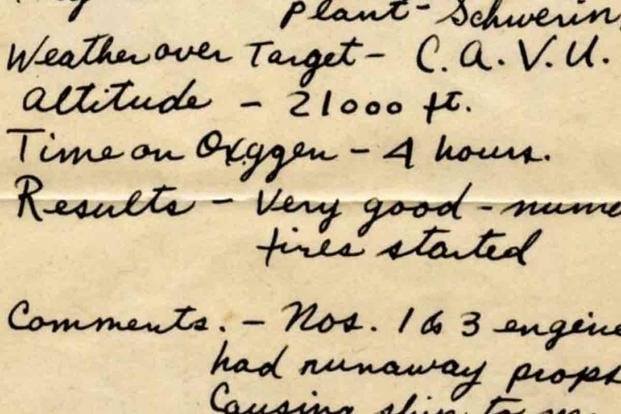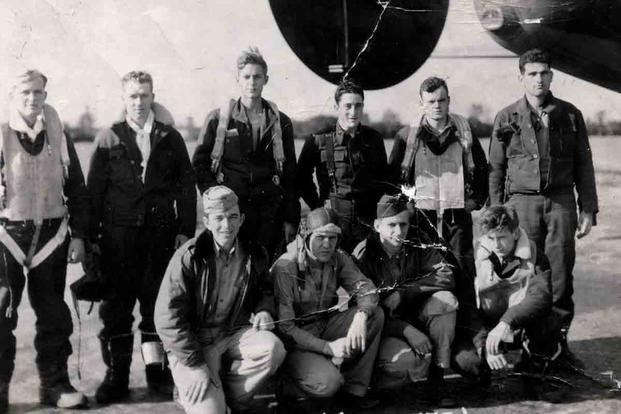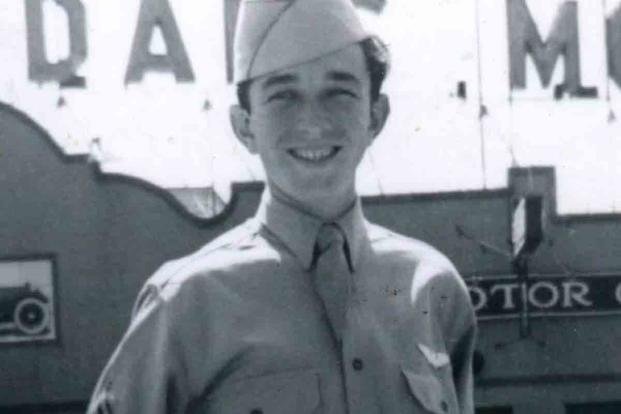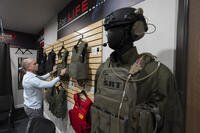As an Amazon associate, Military.com earns from qualifying purchases.
"You're not getting any war stories from me," Pincus Mansfield would say when prompted to talk about his time in World War II.
Mansfield was just like many Americans of his generation. When his country was attacked, he wanted to serve. Unlike many of his generation, he had only one good hand. So when he was drafted at age 18, he was summarily rejected by the draft board. But young Pincus didn't stop trying to join the U.S. military, and on Aug. 13, 1943, he was finally accepted as a waist gunner on an Army Air Forces B-24 Liberator Bomber.
And that was all Pincus Mansfield's son Howard knew about his father's wartime service for most of his life. In 2018, the elder Mansfield moved into a veterans home, and his sons began to clear his belongings out of the only house their family had ever lived in, one his father purchased in 1953. That's when Howard discovered a small diary, one that contained a detailed account of each of his father's bomber missions.
"I Will Tell No War Stories: What Our Fathers Left Unsaid about World War II" is a new book, written by Howard Mansfield, using that diary and historical records to recreate the story of his father's service.
"I began to fill in the details, helped by miles of microfilmed records of the Army Air Forces," Howard Mansfield writes in the book's introduction. "The memories he had recorded in his last years of growing up, and training for the war, memories that always stopped well short of what happened in the air at war."

Howard, one of two brothers, grew up to become a writer, publishing a dozen books and even more articles over the course of his career. Before finding the journal, the closest he'd ever come to realizing his father's wartime experience happened during a visit to England, where he was invited to watch a 1941 Royal Air Force short film called "Target For Tonight" with a group of British aviation enthusiasts.
The film shows RAF Bomber Command crews preparing for a mission over occupied Europe, their target near the Rhine River. With gripping detail, the film shows how dangerous the life of a bomber crew in World War II really could be. The British, however, were bombing German targets at night. Upon entering the war, the Americans would hit Nazi-occupied Europe during the day -- and would take the casualties that came with such daring raids.
By 1943, American bomber crews suffered a 75% casualty rate, as killed, wounded or captured. Only 25% of its crew could finish a 25-mission tour of duty. The Eighth Air Force alone took some 26,000 casualties, more than the Marine Corps through the entirety of World War II. That's how Pincus Mansfield and his one working hand finally convince the Army Air Forces to accept him.
After training, Mansfield was sent to the 453rd Bomb Group at Old Buckenham in East Anglia. Eight months after enlisting, he flew his first mission. On Aug. 4, 1944, the target was the Focke-Wulf assembly plant in Schwerin, Germany. Mansfield, too, would become a casualty before completing his 25th mission. On Oct. 7, 1944, he was hit by flak while attacking the Henschel & Sohn Tiger tank facilities, his 19th mission. Though wounded in the legs, buttocks and face, he made it back to the "Old Buc" and was sent stateside to recover. He spent 164 days in the hospital -- well more than twice as many days as he spent in combat.

Along with Pincus Mansfield's personal account of the raids, "I Will Tell No War Stories" also offers charming asides. These include his waist gunner training, his stateside time after recovering from his wounds and what it was like to serve under the 453rd Bomb Group's operations officer, Jimmy Stewart.
"I Will Tell No War Stories" is not only a deep, personal dive into the history of World War II. Howard Mansfield's love for his father and his appreciation for what Pincus experienced during the war shows through with every turn of the page. Airmen weren't allowed to keep personal diaries during the war, but books such as this leave us to wish every single one of them had done it anyway.
When Pincus settled down after the war, got married and had children, he never talked about his experiences and his children learned not to ask. It was only the diary Howard found in his father's drawer the year before he died that gave any clue as to why. Along with the accounts of his air missions, there were hints of their intensity and hints as to why he wouldn't want to talk about it.
"Other people just wouldn't understand," the younger Mansfield would later write of his father's thoughts.
Pincus Mansfield watched bombers get blown up midflight -- 10 men, some friends, dead in an instant as his own plane filled with holes from exploding flak and enemy fighters. In reading his father's firsthand experiences during the war, Howard Mansfield learned why The Greatest Generation was also the quietest.
Keep Up With the Best in Military Entertainment
Whether you're looking for news and entertainment, thinking of joining the military or keeping up with military life and benefits, Military.com has you covered. Subscribe to the Military.com newsletter to have military news, updates and resources delivered straight to your inbox.

















